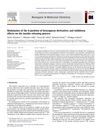 49 citations,
January 1994 in “The Journal of Steroid Biochemistry and Molecular Biology”
49 citations,
January 1994 in “The Journal of Steroid Biochemistry and Molecular Biology” RU 58841 may treat acne, hair loss, and excessive hair growth.
[object Object]  22 citations,
August 2011 in “Journal of Supercritical Fluids”
22 citations,
August 2011 in “Journal of Supercritical Fluids” Rice bran extract might help prevent hair loss.
 260 citations,
July 2010 in “Cell”
260 citations,
July 2010 in “Cell” Mutations in the SRD5A3 gene cause a new type of glycosylation disorder by blocking the production of a molecule necessary for protein glycosylation.
 6 citations,
April 2014 in “European journal of medicinal chemistry”
6 citations,
April 2014 in “European journal of medicinal chemistry” New compounds similar to cromakalim were less effective at inhibiting insulin release but improved in solubility and one acted as a calcium entry blocker, not a potassium channel opener.
 March 2024 in “Bioactive Materials”
March 2024 in “Bioactive Materials” New treatment using engineered nanovesicles in hydrogel improves hair growth by repairing hair follicle cells in a mouse model of hair loss.
 67 citations,
January 2022 in “Theranostics”
67 citations,
January 2022 in “Theranostics” Advanced nanocarrier and microneedle drug delivery methods are more effective, safer, and less invasive for treating skin diseases.

The skin is a complex barrier for drug penetration, but understanding its structure and interactions can improve drug delivery methods.
 5 citations,
September 2020 in “Molecules”
5 citations,
September 2020 in “Molecules” Extracts from three Polynesian plants were found to promote hair growth by affecting cell growth and gene expression related to hair.
 13 citations,
May 2011 in “Bioorganic & Medicinal Chemistry”
13 citations,
May 2011 in “Bioorganic & Medicinal Chemistry” Changing the 6-position on benzopyran molecules affects insulin release, with some compounds showing strong inhibitory effects.
 42 citations,
March 2014 in “European Journal of Pharmacology”
42 citations,
March 2014 in “European Journal of Pharmacology” Ginsenoside F2 from ginseng may increase hair growth better than standard treatments by affecting cell growth signals.
 64 citations,
March 2006 in “Food Chemistry”
64 citations,
March 2006 in “Food Chemistry” The triterpenoids from Ganoderma lucidum can block testosterone effects and may help treat enlarged prostate.
 July 2023 in “bioRxiv (Cold Spring Harbor Laboratory)”
July 2023 in “bioRxiv (Cold Spring Harbor Laboratory)” Chitosan slows root hair growth and causes a buildup of callose at low concentrations, but at high concentrations, it only inhibits growth without callose buildup.
 16 citations,
August 2004 in “Tetrahedron”
16 citations,
August 2004 in “Tetrahedron” Scientists made all eight versions of a compound called cyoctol, but found it's not an anti-androgen and it fully breaks down in the skin.
 28 citations,
November 2020 in “Journal of Controlled Release”
28 citations,
November 2020 in “Journal of Controlled Release” A new hair loss treatment uses tiny needles to deliver a drug-loaded lipid carrier, promoting hair growth more effectively than current treatments.
 April 2024 in “Frontiers in pharmacology”
April 2024 in “Frontiers in pharmacology” Cynoglossum amabile has medicinal potential but poses safety concerns due to liver toxicity.
 26 citations,
May 2013 in “Marine Drugs”
26 citations,
May 2013 in “Marine Drugs” Ishige sinicola, a type of seaweed, may help hair grow by blocking a hair loss-related enzyme and boosting important cell growth.
9 citations,
April 2018 in “Biology of reproduction” Diet changes hormone levels in pregnant ewes by affecting metabolism, not placental synthesis.
 8 citations,
May 2023 in “Gels”
8 citations,
May 2023 in “Gels” Chitosan hydrogels are promising for repairing blood vessels but need improvements in strength and compatibility.
 1 citations,
April 2023 in “International Journal of Molecular Sciences”
1 citations,
April 2023 in “International Journal of Molecular Sciences” New CRISPR/Cas9 variants and nanotechnology-based delivery methods are improving cancer treatment, but choosing the best variant and overcoming certain limitations remain challenges.
[object Object] 2 citations,
December 2023 in “Pharmaceutics” Inhaling medicine may reduce side effects and improve treatment for a major lung cancer type.
 November 2023 in “Dermatologica sinica/Zhōnghuá pífūkē yīxué zázhì”
November 2023 in “Dermatologica sinica/Zhōnghuá pífūkē yīxué zázhì” Upadacitinib helped regrow hair in a severe alopecia areata patient but stopping treatment caused hair loss to return.
 30 citations,
October 2015 in “Journal of Ethnopharmacology”
30 citations,
October 2015 in “Journal of Ethnopharmacology” Herbal compounds like ricinoleic acid, quercetin-3-O-rutinoside, and hinokiflavone may be safe and effective for treating hair loss.
 28 citations,
March 2019 in “Journal of Dermatological Science”
28 citations,
March 2019 in “Journal of Dermatological Science” The document concludes that while lab results for hair growth promotion are promising, human trials are needed and better testing methods should be developed.
 June 2015 in “Biomedical and biopharmaceutical research”
June 2015 in “Biomedical and biopharmaceutical research” The congress showed advancements in skin hydration, barrier function, and safe, effective new cosmetic formulations.
 16 citations,
September 2020 in “British journal of dermatology/British journal of dermatology, Supplement”
16 citations,
September 2020 in “British journal of dermatology/British journal of dermatology, Supplement” The article suggests that targeting specific immune pathways could help control and treat the skin disease hidradenitis suppurativa.
 139 citations,
December 2020 in “Cell Stem Cell”
139 citations,
December 2020 in “Cell Stem Cell” Male hormones affect COVID-19 severity and certain drugs targeting these hormones could help reduce the risk.
May 2024 in “Pharmacia/Farmaciâ” Purple sweet potato leaf extracts can help treat hair loss and fungal infections.
 May 2024 in “FEBS open bio”
May 2024 in “FEBS open bio” Annurca apple extract may help treat hair loss and protect against oxidative stress.
 36 citations,
January 2010 in “Human & experimental toxicology”
36 citations,
January 2010 in “Human & experimental toxicology” Eating paradise nuts led to selenium poisoning, causing nausea, hair loss, and other symptoms in two women.
 2 citations,
August 2020 in “JCRPE”
2 citations,
August 2020 in “JCRPE” A girl with Denys-Drash syndrome was misdiagnosed due to biotin affecting her hormone test results.



























